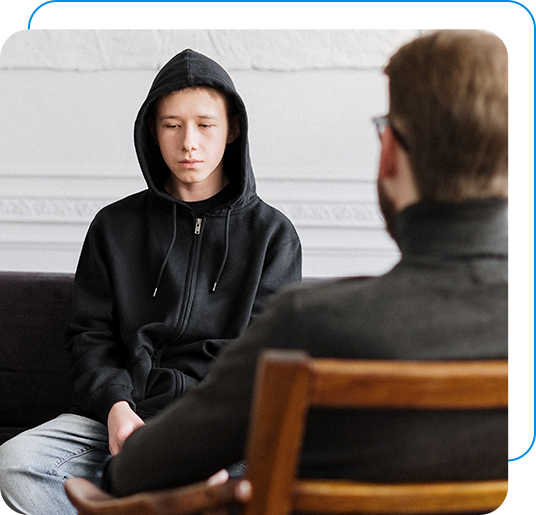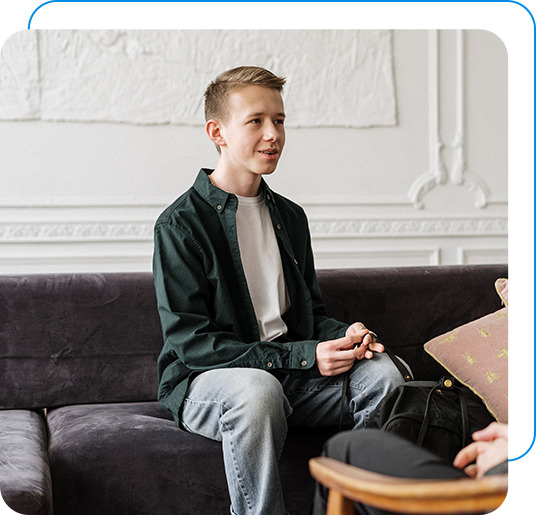Counselling services
Expert Anxiety Counselling and Therapy in Calgary
If you are struggling with the pain of anxiety, we would like to help you with our anxiety counselling services. Anxiety is treatable, and seeking help from a registered psychologist as soon as possible allows you the greatest chance for recovery.
Reach out to us to book a session today.

What is Anxiety Counselling?
Anxiety counselling, otherwise known as talk therapy, helps people overcome the experience of many forms of anxiety.
Anxiety is normal. It’s something everyone experiences at times. It’s also adaptive. Anxiety is the body’s way of helping you deal with real danger (like allowing you to jump out of the way of a speeding car) or perform at your best (like motivating you to prepare for a big presentation).
If your anxiety response is incongruent with the threat at hand, you may be dealing with excessive anxiety that isn’t normal or healthy. Trust yourself. If it feels wrong, it is, and that’s the best time to seek help.

What Causes Anxiety?
Since anxiety is a complex and multifaceted mental health condition, it can arise from a variety of psychological, biological, and environmental factors. Some common causes of anxiety include:
- Financial hardship
- Major life transitions
- Workplace stress
- Certain medications
- Various mental health conditions, such as depression and eating disorders
- Social phobia
- Medical issues, such as chronic pain, thyroid problems, heart palpitations, chest pain and more
- Childhood distress or trauma
- Imbalance of neurotransmitters
- Family history of anxiety
Common Signs & Symptoms of Anxiety
Anxiety can cause numerous symptoms in your heart, mind, and body as it prepares for danger. These sensations are called the fight or flight response, and happen when the body’s natural alarm system is activated to keep your body safe from a real or perceived threat.
Some of the most common symptoms and signs of anxiety include:
- Trouble sleeping
- Feelings of hopelessness
- Feelings of sadness and/or guilt
- Feelings of worthlessness
- Excessive worry
- Shortness of breath/rapid breathing
- Vision changes
- Hot and cold flashes
- Heart rate palpitations
- Changes in appetite
- Disinterest in daily activities
- Feelings of restlessness
- Lack of concentration or energy
- Dry mouth
- Feeling of choking
- Feeling of dread
- Insomnia
- Fatigue

The Different Types of Anxiety Disorders
If depression is a sadness disorder, then anxiety is a fear disorder. Anxiety involves being overcome by overwhelming feelings of fear, feeling unsafe, and being out of control in a world that lacks complete safety.
There are many different types of anxiety disorders:
- Generalized anxiety disorder
- Panic disorder
- Agoraphobia
- Social anxiety disorder
- Health anxiety
- Post-traumatic stress disorder (PTSD)
- Illness anxiety disorder (substance/medication)
- Anxiety disorder due to other medical conditions
General Anxiety Disorder
Panic Disorder
Social Anxiety Disorder
Social anxiety is used to describe anxiety that occurs in response to a connection with others or a fear of being in front of others. It may occur when you’re in a situation with another person or even thinking about going to a party, attending a job interview, or walking around on the street.
Phobias
Phobias are a type of anxiety disorder that causes an individual to experience extreme, irrational fear about a situation, place, or object with which they have a deep sense of terror. These negative thoughts and feelings often cause a panic attack.
Post-Traumatic Stress Disorder
- Finding out a partner has cheated
- Being sexually abused as a child
- A natural disaster
- Being in an accident
- Rape
- Loss of a loved one
- Medical procedure
- Seeing someone die or under threat of death
Obsessive-Compulsive Disorder
Obsessive-compulsive disorder (OCD) is an anxiety disorder with an underlying cause of traumatic, unprocessed memories.
For example, finding out a partner has cheated can cause a vicious cycle of obsessions and compulsions where the victim constantly:
- Feels unwanted or uncomfortable
- Has intrusive thoughts, images, or emotions
- Has urges that trigger intensely troubling feelings
How Does Counselling Help with Anxiety?
Therapy for anxiety can help to calm your nervous system, giving you mindfulness techniques and coping strategies that help reassure you that you won’t break down from the perceived threat.
Many people don’t recognize their anxiety for what it is and instead, think there is something “wrong” with them.

When Should You Get Help for Anxiety?
When you feel that it’s time to reach out, that’s when you should get help.
You know when you’re struggling. Recognizing anxious thoughts and behaviours that make you uncomfortable and finding ways to manage those situations differently can help you be in control of your anxiety rather than letting it control you.


Our Approach To Anxiety Treatment
Our therapists, based in Calgary, Alberta, have years of experience and expertise in providing anxiety treatments and psychological services to treat anxiety.
Anxiety therapy options and methods include:
- Eye movement desensitization and reprocessing (EMDR)
- Cognitive behavioural therapy (CBT)
- Stress-management techniques and coping skills
- Narrative therapy
- Relationship therapy
- Solution-focused therapy
When you talk to a mental health professional about anxiety, they will help you determine the root of your anxiety, help you manage stress in your daily life, and provide anxiety management techniques. Our anxiety therapists can also consult with your doctor if you’d like. Your doctor may prescribe antidepressants, anxiety-reducing medications, or beta-blockers to help manage anxiety symptoms.
Get in touch with us today to book your first psychological treatment.
Begin Your Anxiety Recovery Journey Today
Recognizing the physical symptoms of anxiety is the first step toward changing them.
Ask yourself:
- What happens when I'm anxious?
- Where do I feel the anxiety in my body?
- What have I been through that has reduced my resiliency and made me feel under this level of threat?
This begins your road to recovery.



Book an Appointment for Anxiety Counselling
If you’re experiencing anxiety, book a counselling appointment. Our Anxiety Counselling is led by highly-trained registered psychologists from our office in Calgary, Alberta.

Frequently Asked Questions
Anxiety is a very natural emotion that most people experience in their everyday life. However, when anxiety becomes persistent, debilitating, and interferes with your daily life, it can indicate an anxiety disorder. An anxiety disorder is a medical condition that causes excessive and irrational fear or worry.
Anxiety counselling is a proven method for treating various forms of anxiety. However, the effectiveness of the treatment varies from person to person. At Can’t We Just Get Along Counselling, each experienced therapist works hard to ensure your anxiety therapy is tailored to your specific type and severity of anxiety, ensuring you receive the best possible support on your journey to managing anxiety.
If you have gone through the therapy process and believe medication may be helpful for your situation, our registered psychologists can consult with your doctor to ensure it's the best solution for you. If medication is needed, your doctor will prescribe you antidepressants, beta-blockers, or anxiety-reducing medications to help manage your anxiety.
Anxiety and depression are both negative emotional states that can be accompanied by a range of negative body reactions, thoughts, and behaviours.
- Sadness is the main characteristic of major depression
- Fear and worry are the main characteristics of anxiety
Both states are nervous system conditions. Depression is experienced as hypo-arousal, whereas anxiety is experienced as hyperarousal.
It’s common for many people suffering from an anxiety disorder to go years without a proper diagnosis. Our anxiety psychologists have extensive experience and can help you with a diagnosis and treatment plan to support your unique needs and create long-lasting results. You do not need a referral from a family physician to receive a diagnosis of anxiety.
Yes! Anxiety isn’t a lifelong sentence—it can be treated so that you are free of the often debilitating symptoms. Get in touch with us to book your first session and start your journey to better mental health.
